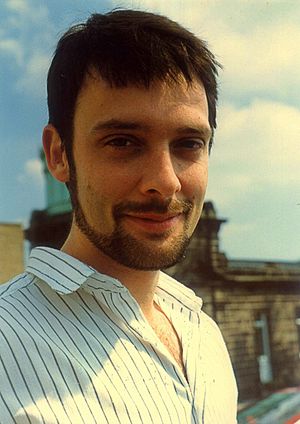John A. Peacock facts for kids
Quick facts for kids
John Peacock
FRS FRSE
|
|
|---|---|

Peacock in 1989
|
|
| Born |
John Andrew Peacock
27 March 1956 Shaftesbury, England
|
| Alma mater | Jesus College, Cambridge |
| Known for | Large-scale structure of galaxies |
| Spouse(s) | Heather Peacock |
| Awards | Fellow of the Royal Society of Edinburgh (2006) Fellow of the Royal Society (2007) Shaw Prize in Astronomy (2014) Gold Medal of the Royal Astronomical Society (2023) |
| Scientific career | |
| Fields | Astrophysics, Cosmology |
| Institutions | University of Edinburgh |
| Thesis | The radio spectra and cosmological evolution of extragalactic radio sources (1981) |
| Doctoral advisor | Malcolm Longair, J. Wall |
John Andrew Peacock, born on March 27, 1956, is a British scientist. He is an expert in cosmology, which is the study of the universe. He is also an astronomer and a professor. Since 1998, he has been a Professor of Cosmology at the University of Edinburgh in Scotland. In 2014, he won a very important award called the Shaw Prize.
John Peacock's Early Life and Education
John Peacock was born in Shaftesbury, England. He grew up in Dorset. He went to Jesus College, Cambridge to study science. In 1977, he earned his first degree with top honors.
After that, he continued his studies at the University of Cambridge. He worked at the Cavendish Laboratory. In 1981, he earned his PhD degree. His research was about radio signals from space. He studied how these signals change as the universe grows.
Family Life
In 1982, John Peacock married Heather. She is a nurse and also teaches about medicine. They have three children together.
Awards and Recognitions
John Peacock has received many important honors for his work. In 2006, he became a Fellow of the Royal Society of Edinburgh (FRSE). This is a group of top experts in Scotland.
The next year, in 2007, he was chosen as a Fellow of the Royal Society (FRS). This is one of the oldest and most respected science groups in the world.
In 2014, he won the Shaw Prize for Astronomy. He shared this award with two other scientists, Daniel Eisenstein and Shaun Cole. They won for their work on the large-scale structure of galaxies. This means they helped us understand how galaxies are spread out in the universe. Their work helped scientists figure out more about how the universe works.
In 2023, he received the Gold Medal of the Royal Astronomical Society. This is the highest award given by the Royal Astronomical Society.
 | Bessie Coleman |
 | Spann Watson |
 | Jill E. Brown |
 | Sherman W. White |

